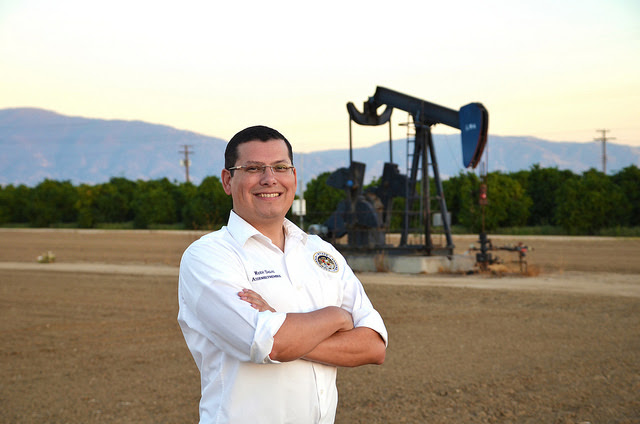
March 24, 2019
Assemblymember Rudy Salas, Jr. represents a hardscrabble district within the rural heart of the San Joaquin Valley.
Assembly District 32 is a little bit Kern County and a lot Kings County. It’s dominated by agriculture and oil. About 30 percent of its nearly half-million residents live below the poverty line. The median income for an AD 32 household is only 60% of the state median household income.
And its air pollution is bad.
The district sits at the southern end of an air basin that contains two major truck routes (I-5 and Highway 99), more than a million dairy cows, and oil and gas rigs galore. The emissions from these three sources alone are literally breathtaking, making this air basin one of the two most polluted in the country.
Despite this sad pollution picture, Salas, a Democrat who beat a Republican for a seat in 2012, has avoided voting for bills that would irritate the industries contributing pollution to his district.

Photo by rudysalas.com
It’s easy to understand why: Big oil and big ag are always willing to target a legislator from the San Joaquin Valley who aggressively represents the interests of breathers. Salas likely couldn’t retain his seat if he always voted the way, say, Sierra Club California wanted him to vote on bills that would protect his constituents from air pollution.
That’s why we’ve never been surprised by his scores on our annual legislative report card. His average score over the six years he’s been in office is about 47 percent. That’s somewhere around an F-minus. His highest score was in 2015, when he received 67 percent and his lowest was during his first year, 2013, when he received a 22 percent. Last year, 2018, was his second worst year, with a score of 36 percent.
During those years, among the bills Salas has voted against or walked away from are bills that would have reduced climate pollution, tightened restrictions on oil drilling, cut oil and gas pollution, and ensured more environmental justice representation on the air pollution control district board in Los Angeles. These were all bills the oil industry opposed, too.
This voting record is one reason we were a bit surprised recently when Salas expressed his passion for cleaning up the air pollution in AD 32.
That expression came during his testimony at the Joint Legislative Audit Committee that he chairs, when he was pressing his colleagues on the committee to vote for an audit of the California Air Resources Board (CARB) and its transportation and climate pollution control programs.
Now audits are good and valuable things generally. They’re inconvenient, but sometimes inconvenience is needed to make sure all things are in good order.
But in this case, Salas’ audit request seemed ill-timed and unnecessary.
The California Air Resources Board (CARB) has been under scrutiny by the so-called Moderate Caucus of the legislature for at least the last 15 years, and particularly since the board began implementing Assembly Bill 32, the Global Warming Solutions Act of 2006. CARB has been responding by carefully reporting on nearly every action it takes. Its website is a trove of data and reports. (In case any of the curious Mod Caucus members are reading this, that website address is http://www.arb.ca.gov.)
The audit request came at a time when the air board has been fighting the Trump Administration’s efforts to roll back California’s ability to control pollution from automobiles.
If one had an orientation toward conspiracy theories—and I want to make it clear here that I do not tend to lean toward conspiracy theories—one might think the notion of auditing the air board was generated by automakers or the oil and gas industry to disrupt CARB’s ability to concentrate on fighting Trump and advancing zero-emission vehicles.
The audit request was there on the table when Assemblymember Salas testified that he was motivated by his passion to cut air pollution in his district. Very delicately, the co-chair of the Committee, and a little less delicately, a couple of other senators on the committee, persuaded Salas that the $447,000 that the state auditor would charge for the audit could be avoided if the assemblymember supplied CARB’s executive director with some questions that the board could respond to directly.
As it happened, Salas had handy, at that very moment at that hearing, a list of 25 questions he wanted answered—far more than the handful he had included in the audit request. And then, a day or two later, Salas sent a letter to CARB with an expanded list of 29 questions to which he wants answers.
In the meantime, while CARB staff comb their data and reports for the answers Salas is seeking, the assemblymember has introduced a bill that appears to be designed to undercut CARB’s current efforts to transition the truck fleet over to zero-polluting engines and away from dependence on polluting fuels like oil and gas.
We sincerely appreciate any legislator who is interested in cutting pollution. Salas, by the way, is an active member of the Moderate Caucus, so we especially appreciate his apparently newfound passion for cutting pollution.
After the audit hearing, I reached out to Assemblymember Salas’ office to meet with him directly to better understand his concerns and how we can work together to get at the awful pollution in his district.
So far, he hasn’t been available to meet.
Sincerely,

Kathryn Phillips
Director
Sierra Club California is the Sacramento-based legislative and regulatory advocacy arm of the 13 California chapters of the Sierra Club.
Please consider making a monthly donation.